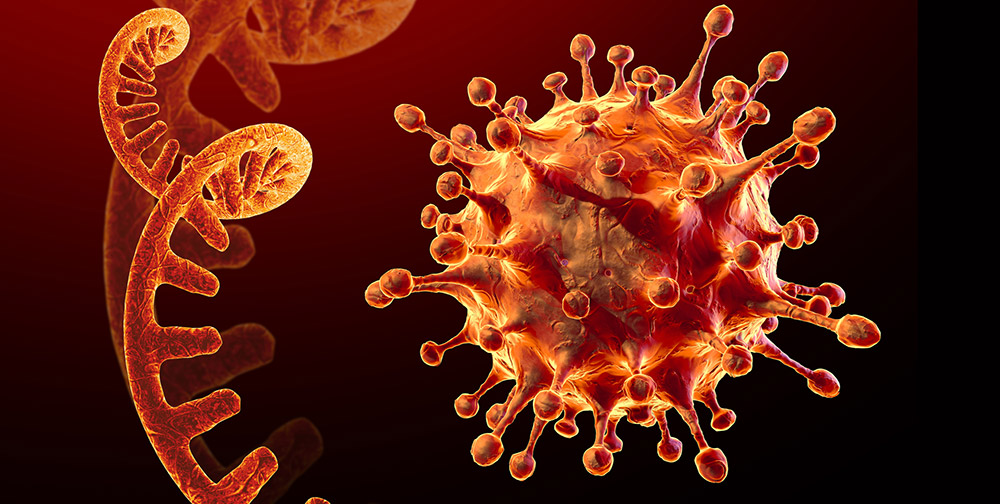
Corona: A new inhibitor has been identified – a molecule that prevents cells from being infected with SARS-CoV-2 – but differs from common antibodies
‘Sticky’ blockage: German researchers have discovered a molecule that works against SARS-CoV-2. It’s a short strand of DNA that binds to the protein of the virus and prevents it from entering the cell – at least in cell culture experiments. Since this bonding does not initiate at the spike protein binding site, it will likely remain effective in new mutants as well. This may open up new treatment options for Covid-19.
Even if many vaccines against Covid-19 are now given – an effective treatment against Covid-19 for those already infected with the Coronavirus is still missing. Virus replication can be achieved using antiviral agents such as Remdesivir or Antibody preparations It contains something, but these agents usually only work at the beginning of the infection. In severe cases, cortisone preparations such as Dexamethson They are used to dampen excessive inflammatory reactions at least to some extent.
DNA fragment as the broken molecule
But doctors are still looking for an effective ingredient that can completely stop the infection. Anton Schmitz and colleagues from the University of Bonn have identified a new candidate. It’s what’s called a aptamer – a short piece of single-stranded DNA. Aptamers can bind tightly to proteins by means of hydrogen bonds and electrostatic gravity and then strongly and specifically bind to them as an antibody.
That’s why Schmitz and his team were specifically looking for an aptamer that they could adapt to Spike Protein From SARS-CoV-2, it can be attached. The binding site that the virus binds to the ACE2 receptor is located in our cells and thus gains entry on this crown-like protein. If the protein is blocked, the cell will not be infected with SARS-CoV-2. To see which aptamer does this, the researchers first devised a large number of different aptamer variants and examined their affinity for the viral spike protein in an automated test.
The team actually found what they were looking for: an aptamer with the abbreviation SP6, which is now isolated, binds to the spike protein and, to some extent, binds it together. In cell culture experiments, the addition of aptamer was shown to effectively prevent infection of cells with a test virus carrying the spike protein. Although these viruses were still able to bind to cells, they were no longer able to penetrate them, as scientists discovered.
Prevents infection – mechanism still unknown
The interesting thing about it: aptamer SP6 has this neutralizing effect, although it does not block the binding site of the spike protein, but it binds more closely to what is called the S2 fragment of this virus protein. This is where it differs from the common neutralizing antibodies against SARS-CoV-2: “Most of the antibodies we know today prevent fusion. They attach themselves to a portion of the spiky protein responsible for recognizing ACE2 – the receptor binding domain,” Schmitz colleague Gunter Mayer explains. .
On the other hand, aptamer anchors outside this link site – but it appears to still be effectively preventing the virus from replicating. “One of the cool and unexpected aspects of SP6 is that its inhibitory effect does not depend on the fact that it interferes with the interaction of the spike protein with the AC2 receptor,” Schmitz and his team explain. “The molecular mechanism by which SP6 prevents virus infection remains unknown.”
More effective against mutants?
But specifically, this new way of making aptamers could be an important feature: SARS-CoV-2 mutations in circulation today, including above all “the British”. Alternative B.1.1.7., But also other strains with partially similar mutations predominantly carry changes to the spike protein binding site. She does Less vulnerable For body-specific antibody but also antibody equivalent.
In contrast, the new active ingredient SP6 targets another portion of the prickly protein that does not change much due to mutations. “More escape mutations at the binding site are expected in the future. Therefore, independent methods of preventing infection are important and should be researched further,” Schmitz and colleagues stated. Aptamers like SP6 could be a component of these alternative inhibitors for SARS-CoV-2.
“The more such mutations accumulate, the greater the risk that available drugs and vaccines will be discontinued,” stresses Meyer. “Our study may call attention to an alternative Achilles heel pathogen.”
Some tests are still needed
However, before using the aptamer discovered by researchers in patients, it must first be tested in animal experiments. However, if its effect is confirmed, it may possibly be given simply via a nasal spray. (Angewandte Chemie International Edition, 2021; Doi: 10.1002 / anie.202100316)
Source: Rheinische Friedrich-Wilhelms-Universität Bonn

“Organizer. Social media geek. General communicator. Bacon scholar. Proud pop culture trailblazer.”
